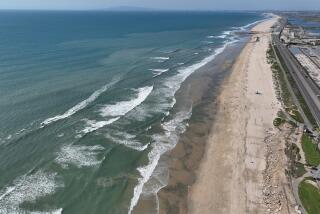ORANGE COUNTY VOICES : Conserve More Oil and Spill Less
- Share via
Just a year ago, Southern Californians were stunned by an oil spill off Huntington Beach.
The spill itself was a small one, if measured in relative terms of environmental damage. About 400,000 gallons of oil spewed into the Pacific Ocean when the American Trader impaled itself on its anchor off Huntington Beach.
By comparison, 10 million gallons of oil spilled from the Exxon Valdez when it ran aground on Blye Reef in Prince William Sound, Alaska, a year before.
And in the last two weeks, the world witnessed Saddam Hussein declare the ultimate act of war on the environment, intentionally pouring an estimated 147 million gallons of oil from pipelines and tankers into the Persian Gulf.
A year ago, in Southern California, we were comparatively lucky. Tidal conditions and winds allowed booms and skimmers to control most of the oil slick before it washed into Bolsa Chica Marsh where it would have threatened one of Southern California’s most fragile and important estuarine habitats.
Today, the beaches are clean, and unless you were there a year ago, you might not even remember the spill. But at the time, the Huntington Beach oil spill stirred Southern California’s environmental conscience unlike any event since the Santa Barbara Channel oil rig blowout in 1969, which presumably marked the beginning of the American environmental movement.
Similarly, the attention focused on the Huntington Beach oil spill prodded the Legislature and the governor to enact the nation’s first oil-spill prevention and response plan.
The State Lands Commission, which sponsored the oil-spill legislation last year, has opened its oil terminal inspection offices--which monitors the Huntington Beach terminal--no less than eight times in the last two months. This week, the commission will begin a process which could lead to tougher safety standards at the 20 offshore oil terminals California leases.
Additionally, we have an agreement with the U.S. Coast Guard to coordinate inspection of oil transport facilities and vessels.
Our goal is to prevent oil spills from occurring. That is a tremendous challenge when you consider that there are 2,500 tanker arrivals at California ports each year. The fact is, prevention will never be a fail-safe answer to protect our coast. We must reduce our dependence on oil.
The United States depends on foreign oil to meet 50% of its domestic needs. Already, there are an average of 27 oil spills registered every day in the United States, illustrating the risks of our oil dependence.
This week, the Department of Energy is scheduled to release its budget, which serves as an annual statement of energy planning--or lack of planning as we have come to know it. Any new proposed leases of offshore oil tracts, which would quench just a fraction of our thirst for oil, is simply not justifiable on an economic, environmental or moral basis in the absence of a plan which addresses our future energy needs.
A national energy policy must offer greater emphasis on conservation and the development of alternative energy supplies. The improved energy efficiency of the U.S. economy since 1973 has saved the equivalent of 14.5 million barrels of oil a day in 1989. Experts tell us that we could save another 20 million barrels a day by the year 2000 by using technology that is available to us today.
Ultimately, reducing our dependence on oil means we need a greater focus on renewable energy sources like solar, wind, biomass and geothermal energy. Our international economic competitors, Japan and Germany, are investing heavily in the use of alternative energy.
None of us likes the sight of oil washing up on our beaches. The lessons taught by negligence in Huntington Beach and Prince William Sound are important. So too, are the oil-price shocks of the energy crisis of the 1970s and those which resulted from the August, 1990, Iraqi invasion of Kuwait. Let’s hope that Washington is thinking about the ultimate oil-spill prevention program: Reducing our dependence on oil by planning for future energy needs.
We have an obligation to make tankers, oil terminals and pipelines as safe and accident-free as possible. But unless we reduce our dependence on oil, the risk of oil spills and the environmental degradation they cause will always haunt us.
More to Read
Sign up for Essential California
The most important California stories and recommendations in your inbox every morning.
You may occasionally receive promotional content from the Los Angeles Times.













